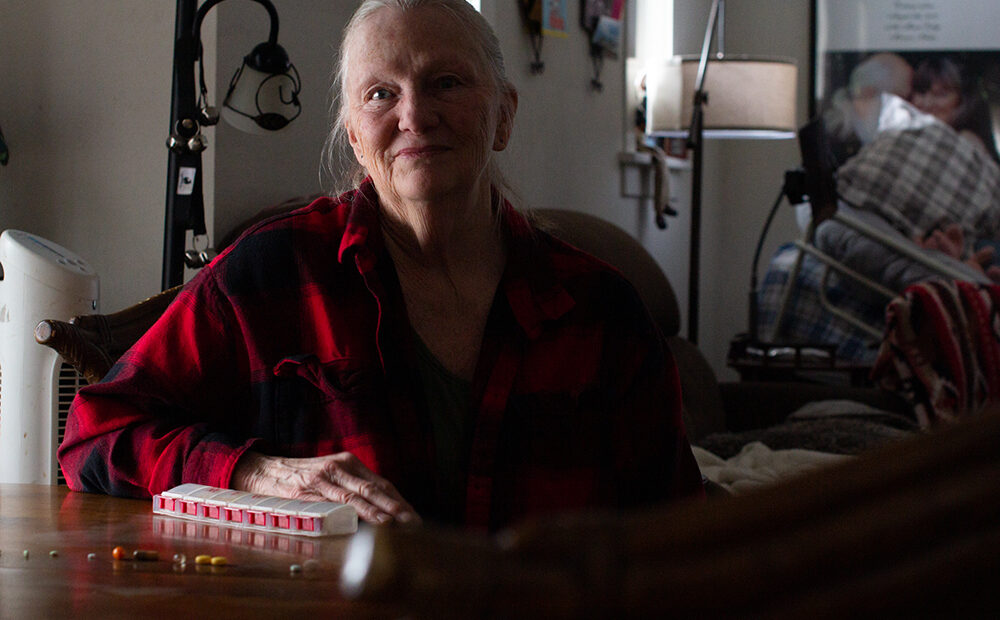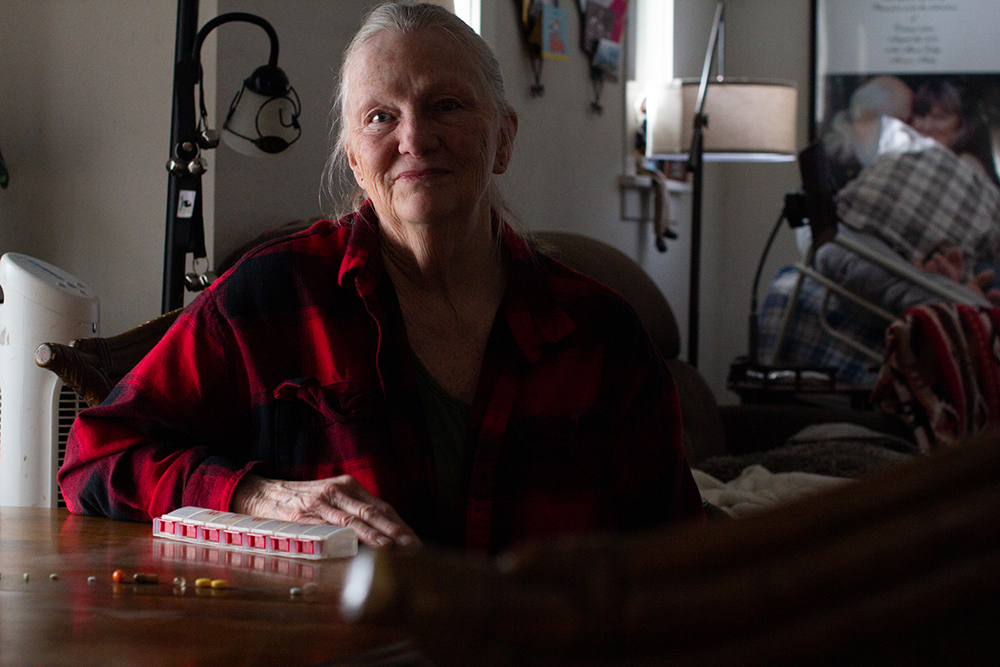
Local pharmacists worry for future as more patients switch to mail order
Listen
(Runtime 4:03)
Read
Local pharmacists said they first learned they could be losing hundreds of customers after patients began calling them early this year. Suddenly, patients insured by Kaiser Permanente were told they would need to fill maintenance medications exclusively through the company’s own mail-order pharmacy.
The change affected current and former public and school employees from Washington. Two of those patients, Deborah and Geoff Beckett, have been going to their local pharmacy in Moscow, Marketime Drug, for decades.
Geoff suffers from diabetes, Parkinson’s disease and heart problems. He’s bedridden and has multiple prescriptions for medications to manage those diseases.
Deborah is his full-time caregiver, and said she relies on being able to ask questions of the local pharmacists who know Geoff and his medical history. He’s been going to the pharmacy longer than they’ve been married — more than 30 years.
“They know more about Geoff than his own kids,” she said. “I can go and talk about bed sores … Geoff qualifies to get a home nurse to come once in a while, but I don’t need [the home nurse.]”
Beckett is one of a few customers who are, at least for now, choosing to pay for those medications out of pocket. She’s liked Kaiser, she said, but wishes they’d provide the option to keep refilling locally.
Paying for Geoff’s prescriptions without insurance will cost Beckett around $160 each month, she said, compared to roughly $62 each month with insurance.

Deborah Becket lines up all of her husband Geoff Beckett’s medications and supplements. She is currently paying for his medications out of pocket to continue filling prescriptions at their local pharmacy after Kaiser Permanente switched customers’ maintenance medications to mail order this year. (Credit: Rachel Sun / NWPB)
Like other customers, Beckett can’t recall any notification of the change prior to open enrollment.
Existing customers should have received letters last October or November that included information about the new requirement, according to an email sent to Kaiser Permanente customers from Washington State University Human Resources on Feb. 24. Information about the program was also included on the PEBB and SEBB Kaiser Permanente microsites. But Beckett said she didn’t know she needed to look for that change.
Another Kaiser customer, Kathryn Jackson, said she doesn’t remember ever seeing a letter.
“If I’d gotten that particular email from [Human Resource Services] in November, a couple months before I refilled my prescription, that would have been helpful,” she said. “Just assuming that people are gonna go to your website, or Kaiser’s website and be looking at every little thing — I don’t have time to do that.”
Kaiser Permanente’s change isn’t an entirely new concept. Some other insurance providers already require, or heavily incentivize, customers to use their own mail order services. The pharmacy benefit manager, Optum Health, has some mail-order requirements, said Chriss Locker, a certified pharmacy technician based in Moscow. However, it is possible to opt out of that option.
Another insurer, TRICARE, changed its refill requirements last October by removing around 15,000 independent pharmacies from its network and requiring customers to either fill prescriptions through mail order, or at larger, big box stores, said Cindy Wendt-Wyatt, co-owner of Wasem’s Pharmacy and Home Medical in Clarkston.
Erik Nelson, who owns Marketime Drug and three other pharmacies in Spokane and Nine Mile Falls, Wash., said those changes are a big concern for him and customers who want to stay local. At Marketime, around 180 patients have been or will be affected, once their 90-day prescriptions run out, Locker said.
Nelson said in addition to losing loyal customers, changes like the one made by Kaiser require him to eat the prescription’s cost when customers are forced to fill somewhere else.
“Let’s say we had ordered a special medication for them that only this one person has, that costs us $3,000 for a bottle,” he said. “We just opened it for the last month’s fill before they had to change where they fill. Now we’re stuck with an open bottle that costs several thousand dollars we’re not going to use.”
Local pharmacists also provide guidance for patients like the Becketts about what medications are safe for them and drug interactions they should know about. Typically when customers come to a local provider, they can ask questions at the counter within a few minutes.
But when they get prescriptions through mail order, they can be put on hold for up to an hour before they reach a pharmacist who can answer questions.
Local pharmacies also are unable to answer questions from those customers, Nelson said, because they no longer have access to the patient’s medical history.
“Legally, we cannot answer any questions for them,” he said. “It’s just too dangerous.”
Wil Edwards, the owner of Sid’s Pharmacy in Pullman, said he understands when customers need to switch to mail-order pharmacy for financial reasons.
However, Edwards said, he thinks customers should have the choice. Switching to mail-order pharmacies for maintenance medications also can make it harder for local pharmacists to advise patients on the correct medications for emergency refills.
“Some of those medicines do require some clinical investigation to make sure they’re appropriate,” he said. “And now I can’t do that nearly as well.”

Sid’s Pharmacy owner Wil Edwards works the front counter Friday, March 10 at Sid’s pharmacy in Pullman. (Credit: Rachel Sun / NWPB)
Edwards said large mail-order pharmacies aren’t able to offer all the same services a small pharmacy like his can. Independent pharmacies can establish agreements with doctors to automatically switch prescriptions that aren’t covered by insurance or aren’t readily available to equivalent prescriptions that are.
That sort of agreement makes it easier for customers to get the prescriptions they need — covered by insurance — with less effort.
“We can proactively take care of our patients,” he said. “Mail orders, they just can’t. They’re just too big. That’s what happens when you treat things like a commodity, you cannot individually help somebody.”
Rep. Joe Schmick (R-Colfax) said he’s benefited from the extra efforts his own local pharmacy put in to get him the prescription he needed. Schmick co-sponsored House Bill 1253 this legislative session, which would have required insurance providers to give their customers a choice in where they fill their prescriptions. But neither it nor its companion, Senate Bill 5213, made it to a floor hearing.
“I think what we take for granted, when we go and see our pharmacist,” Schmick said, “is that few words of advice: ‘Hey, if you’re doing this, you gotta watch out for this.’”
Schmick said he estimates roughly 100 constituents contacted him after Kaiser Permanente customers started getting calls about switching mail order refills in February. The Senate bill could come back next year because of the Legislature’s long session, Schmick said, but it faces an uphill battle.
It’s also not the first bill of its kind. He sponsored another bill last year with similar goals, which died in committee.
Nathan Johnson, the owner of Tick Klock Drug in Colfax, said he estimates roughly 15% of his customers prior to the change were insured by Kaiser Permanente. He worries what will happen to independent pharmacies if other insurance providers follow suit.
“If Kaiser is not made to change, or if this mandatory mail order doesn’t change,” he said, “then there’s no point to have these [local] stores anymore.”
Nelson said he’s concerned about how changes to mail order will affect rural customers. Research by the Rural Health Research Gateway shows between 2003 and 2018, roughly 16% of independent rural pharmacies closed.
Whether the legislature limits insurers the next session is yet to be seen, but customers also have the option to file complaints with the Office of the Insurance Commissioner, Schmick said.
Nelson said in the meantime, it’s important that customers ask questions about their policies. In some cases, patients are led to believe they are required to switch to mail-order pharmacy when they don’t have to.
Services like Senior Health Insurance Benefits Advisors, a service through the Centers for Medicare and Medicaid, can also help answer seniors’ questions about insurance in addition to helping them pick plans, he said.
“[Insurers’] whole motive for sending you this letter is to get you to switch to a different pharmacy, most likely one that they own,” he said. “To me it’s a huge conflict of interest.”
Sun may be contacted at rachel.sunwsu.edu or on Twitter at @Rachel_M_Sun. This report is made in partnership with Northwest Public Broadcasting, the Lewiston Tribune and the Moscow-Pullman Daily News.
















